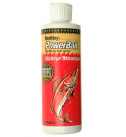




















|
Mark Martin Speaks out about lures and presentations
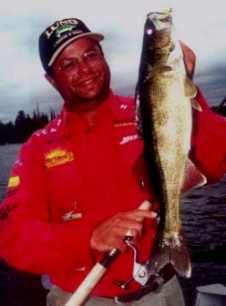
PWT Champion Mark Martin
|
Right now, as winter starts to yield to spring, I'm straightening out
my
tackle box, making a list of new lures and checking it twice. By the
time open water unfolds, I¹m going to be ready with walleye offerings
both
naughty and nice. For simplicity¹s sake, I¹ve come up with
three of the most effective lure and bait styles that will do the trick
wherever you fish;
plus, I¹m adding in the most effective ways to work them. But
until the
moment arrives when you¹re actually out there, you can bide your
time
plotting and planning your tackle selection. Sometimes, it seems, the
anticipation is almost as fun as the action. |
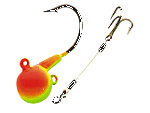
Northland
Fire-Ball. Jig
|
Of all the jigs on the market, none is more effective or versatile
than the Northland
Fire-Ball. They come in sizes from miniature to magnum, giving you
the ability to cover all depths and drop speeds. And they¹re perfect
for snap-jigging, vertical jigging in rivers and lakes, casting and dragging
‹any way you want to fish them. Though they are round jigheads, they excel
even in current because of the slight keel shape of the head, which makes
them track straight running water. |
Fire-Balls are large for their weight, too‹meaning a 1/16th-ounce specimen
is bigger than a lot of regular 1/8th-ouncers‹and have bigger, more dramatic
profile fish like. More than anything, the Fire-Ball is a live-bait jig,
since it comes without
a keeper collar to hold on plastics. I use them with minnows, leeches
and half night crawlers. In springtime, I turn to a few tricks to catch
more fish. When I know a bunch are beneath me, I often bait up with two
small minnows, one hooked upside down, the other right side up. This gives
you a pair of minnows in the shape of a V for a more enticing profile.
And if walleyes are striking short, if one does rob you of one of the minnows,
it will often turn around and grab the remaining bait. Something to remember.
Every once in a while I hook a single minnow upside down. I do it when
I'm fishing very slowly and giving the jig little action; instead, I depend
on
the minnow to do it for me. Upside down, the minnow is prone to extra
antics.
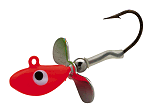
Northland
Whistler Jig
|
Another jig from Northland that has an important place in my tackle
box is the Whistler.
It has a streamlined head and a small propeller for added sound and flash.
If normally I'd fish a 1/4-ounce round jig, I boost up to a
3/8ths with the Whistler because of the added lift you get with the
propeller. Whistlers are great for casting the shallows, around creeks,
rivers and shorelines. When I pitch it out, I often work it almost like
a crankbait. |
When it gets to bottom, I lift it and stop, lift and stop‹perhaps a little
faster than with a standard jig. With a Whistler I like to turn to plastics
as well. Since the Whistlers have a curvature to their hooks, they'll hold
plastics in place without tearing off.
This unusual combination is great in big rivers where the plastics flip
every which way and in times of poor boat control, when you can drag the
fake baits over flats.
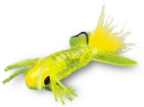 Blue
Fox-ee Jig
Blue
Fox-ee Jig
|
Finally, this spring I'm going to put a few more Fox-ee
jigs
from Blue Fox in my box. They come in standup and bullet heads, both of
which are great in early season around emergent weed beds. Pitch them out,
and they snake their
way surprisingly well through weeds because of their streamlined shapes. |

Shad
Raps
|
Ever since their debut in the ¹80s, Rapals Shad
Raps have been catching fish of all species from coast to coast. For me,
they¹re go-to baits in walleye country, especially in spring, when
I start with a No. 5 in water six feet and less. |
Because you can work them faster than a jig, they help eliminate water,
and suspended fish will come up several feet to strike them. But
like them to tick and nick bottom on the way in. Now, I don¹t exactly
pound them off the bottom, but a little light touch of bottom is perfect.
When you do feel it hit, stop it. Start it up again and when it ticks again,
stop it. Every now and then I will plow it into bottom just to see what
happens. Sometimes it's the ticket. If the water¹s a little deeper,
go with the slightly larger No. 7.

Shad
Rap RS
|
A new weapon in my arsenal is the Shad
Rap RS, a rattling, suspending bait. Once, while doing a Bass Pro Shops
seminar and casting into one of the fish tanks, I had walleyes‹which, as
we all know, ignore almost every bait or
lure in such captivity‹racing after the suspender. |
Like all crankbaits, don¹t just cast them out and reel them in.
Rather, reel it down, tick bottom and pause. The lure will just hover there,
not float up, and walleyes will
grab it. There¹s something about a lure stopping in a walleye¹s
face that it
can¹t resist. With either type of Shad Rap, I like to add a little
extra flash with thin
strips of Witchcraft holoform tape. I also experiment with the company's
adhesive eyes you can stick to the bait. Sometimes it makes a difference.
On Wisconsin¹s Lake Winnebago, for instance, I've found the walleyes
have a definite preference for yellow eyes and black pupils. I don't know
why, but I do know they work.
But there¹s a lot more to a Shad Rap than just casting. Raps are
excellent trolling baits, and I have the depths they track almost down
to a science.
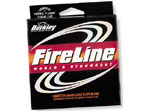
Berkley
20-pound
FireLine
|
Without weight and with Berkley
20-pound FireLine (the diameter of eight-pound monofilament), I can
get a No. 5 down six feet with 63 to 73feet of line, a No. 7 down seven
to 10 feet with 100 to 110 feet of line, a No. 9 down nine, 10, even
12 or 13 feet with 140 to 150 feet of line. Trolling speed is important,
and I almost always run 1 mph to 1.3 mph. If you do go faster, your lures
are going to dig deeper. Try trolling Shad Raps around tight contours when
you want to get a bait into small places on a short line or when you want
to get out and over bottom on lake basins. |
And, lest I forget, when casting add an extra rod, where legal, with live
bait to pick up another fish or two or three. More on that in a moment
The Dead Rod
A dead rod, or one that¹s basically unattended, will liven up
the action
many days.

Northland
Bottom
Bouncer
|
A dead rod, or one that's basically unattended, will liven up the action
many days.When I'm moving along a contour jigging or tossing a Shad Rap,
I¹ll put another rod out with a Northland
Rock-Runner bottom bouncer and a Northland
Gum-Drop Floater with bait.
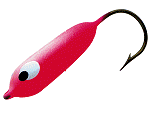
Northland
Gum Drop
|
Gum-Drops are particularly effective in spring due to the fish¹s
slower metabolism. And they¹ll work pulled upstream in a river or
on a flat in a lake while you¹re fishing another rod. I put a fast-action
rod in a holder with a bouncer, a leader up to threefeet and a Gum-Drop
in small, medium or large. |
If fish are tentative I'll use a smaller one. If they¹re more active,
I'll boost up in size, or if I'm around bigger fish. The spongy material
of the floater keeps the bait just above the tops of emergent weeds. It
also helps to keep the bouncer a few inches from bottom. When you get a
strike, the rod will start to bend; pick it up and set the hook. Any bait
‹a leech, crawler or minnow‹will do the trick, but I prefer minnows in
spring. Some Gum-Drops come with stinger hooks, but I don't put the stinger
into the bait. Since the stinger is tied on stiff mono, it will lie right
next to the minnow and help you nail short-strikers. |

Walleyes Inc. website is maintained
by Randy
Tyler Fishing the In-Fisherman Professional Walleye Circuit, Masters
Walleye Circuit and the Team Walleye Circuit. All rights reserved.Copyright
1999/2000
Please visit these site sponsors
Daiichi/Tru-Turn Hooks,
Lindy
Little Joe,
R-A.M Mounting Systems,
Ranger
boats,
Mercury Marine, Bedford
Sales , Hamby's Beaching Bumpers,
Goldeneye
Marine products, Panther
Marine Products, Webfoots body
sock, Bait Rigs Tackle
|





